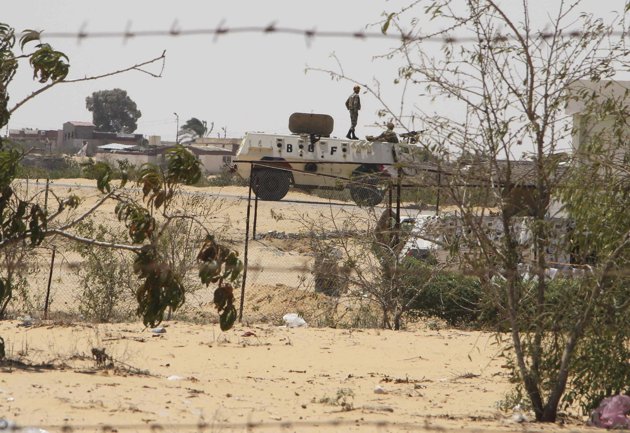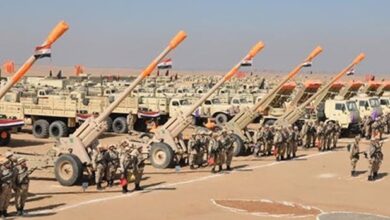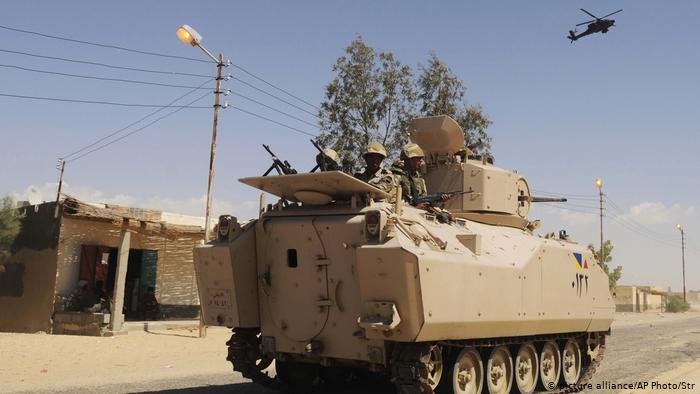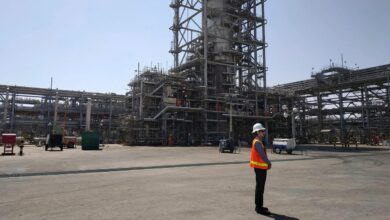
The blood-stained face of a fallen soldier and the seeping red that covers the floor around him fill the front-page photograph of the Freedom and Justice party newspaper. “This blood is my blood,” the caption reads.
Wednesday’s papers try to make sense of the deaths of 16 soldiers on the Egyptian-Israeli border in Sinai Sunday. Some purport to offer insider information about what happened and who was behind it, while others dwell on Egyptian-Palestinian-Israeli relations in the aftermath of the attack.
In his column, Emad Eldine Hussein, editor of the privately-owned Al-Shorouk newspaper, argues that while Israel may have had a role to play in the Sinai massacre, Egyptians still need to look closely at what is happening inside their own borders.
“Before we accuse Israel, we need to be sure that our own house is secure and stable, and that there is national consensus,” he writes.
He suggests that those who carried out the attack could be from Sinai, Upper Egypt, Matrouh or the Delta, and could be Arab or from Afghanistan. It is likely that a larger organization funded and planned the operation, while brainwashing the attackers, he says.
Salafi Jihadists or any other group may be thinking that they are carrying out God’s will, but in fact they are playing into the hands of Mossad, Israel’s intelligence services, Hussein adds.
Another op-ed Al-Shorouk runs by an Israeli researcher in the Dayan Center, Eyal Zayser, also points the finger at radical Islamist jihad groups, affiliated with the global Al-Qaeda network, which he says do not differentiate between Egyptian and Israel soldiers and policemen — both have sold out to the West in their eyes.
Hussein makes a comparison with what happened in the Palestinian resistance movement in the 1970s when Sabry al-Naba, who went by the nom de guerre “Abu Nadal,” formed a breakaway group of the Fatah national movement led by Yasser Arafat. The group was called the Fatah Revolutionary Council and it carried out assassination attacks against Fatah leaders for their negotiations with Israel. In the end though, they were taking away the best leaders of the Palestinian resistance movement to the benefit of Israel, Hussein argues.
He says the security vacuum in Sinai has led to a proliferation of groups under a variety of influences to one primary result: Sinai as an area beyond Egyptian control.
Hussein closes by saying that a unified national response that brings Sinai back into Egyptian control is required. “The question is: do we have this sort of strategy … and if it exists, are we capable of implementing it,” he asks.
On cue, the headline of the next page reads: “A new security plan for dealing with Sinai and Gaza.”
Unnamed sources tell Al-Shorouk about this plan, which has three main priorities: sealing the tunnels between Gaza and Egypt that serve as smuggling routes for food, medicine and weapons, while easing the official border entry route; tightening the entry rules for Palestinians traveling to Egypt, with those coming in from the airport needing to show proof of permission to stay in Egypt, including travellers going to Gaza via Sinai's Rafah border crossing; increasing border security presence, in cooperation with Israel.
Other papers suggest that there is a need to revisit the Camp David Accords signed by Egypt and Israel in the 1970s, which limits the Egyptian security presence in Sinai.
Page four of the state-owned Al-Ahram newspaper says that “a revision of the peace agreement with Israel is an essential demand to prevent going into a war because of terrorists.” It follows with a long exposé on the subject and a hand-drawn map of the Sinai Peninsula and neighboring countries to the east.
The Muslim Brotherhood’s paper, Freedom and Justice, takes the same line. “Revising Camp David … is a national security issue,” one of its headlines reads.
Privately-owned Al-Watan newspaper seems to have a scoop with the head of Egyptian intelligence, Mourad Mawafy, who tells the paper that intelligence had prior knowledge of a planned attack. Unfortunately, Mawafy says they were unable to prevent it because they “never imagined that a Muslim would kill his Muslim brother during iftar in Ramadan.” Mawafy adds that the information they have confirms that an apostate group spread across Sinai and Gaza is responsible for the attack.
Al-Watan and Freedom and Justice report on what Mousa Abu Marzouq, deputy head of the Hamas political bureau, said. He claims that Israeli intelligence gave Egyptian intelligence nine names of terrorists belonging to the Tawhid and Jihad group before Sunday, and warned them of a planned attack.
Egyptian intelligence is awaiting the results of DNA tests on some of the perpetrators killed in the Sinai attack by Israeli forces, Al-Shorouk reports, which should lead to their identification.
Islamist thinker Fahmy Howeidy, who writes in Al-Shorouk, seems to also suggest that a Salafi Jihad group is behind the attack. He finishes his column arguing two main points: first, that the proliferation of these groups is the result of minimal Egyptian security presence in Sinai following the peace agreement and second, that the events require a thorough investigation, because Israel had prior knowledge of the attack. This is evident in Israel's removal of tourists from its shores three days before the assault, while the terrorists faced no resistance from the Egyptian side, he alleges.
A military expert friend of Howeidy tells him that rather than describing the events as a “massacre” it would be more fitting to call it a “farce.”
Egypt’s papers:
Al-Ahram: Daily, state-run, largest distribution in Egypt
Al-Akhbar: Daily, state-run, second to Al-Ahram in institutional size
Al-Gomhurriya: Daily, state-run
Rose al-Youssef: Daily, state-run
Al-Dostour: Daily, privately owned
Al-Shorouk: Daily, privately owned
Al-Watan: Daily, privately owned
Al-Wafd: Daily, published by the liberal Wafd Party
Youm7: Daily, privately owned
Al-Tahrir: Daily, privately owned
Freedom and Justice: Daily, published by the Muslim Brotherhood's Freedom and Justice Party
Sawt al-Umma: Weekly, privately owned
Al-Arabi: Weekly, published by the Nasserist Party
Al-Nour: Official paper of the Salafi Nour Party




